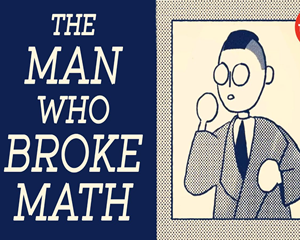Consider the following sentence: "This statement is false." Is that true?
观察以下句子:“这句话是错误的。”这句话是正确的吗?
If so, that would make this statement false. But if it's false, then the statement is true.
如果是的话,那么这句话就是错误的。如果不是的话,那么这句话就是正确的。
By referring to itself directly, this statement creates an unresolvable paradox.
通过引用本身,这句话创造了一个无法解决的悖论。
So if it's not true and it's not false -- what is it? This question might seem like a silly thought experiment.
如果它不是正确的也不是错误的--那么它是什么呢?这个问题看起来像一个愚蠢的思维实验。
But in the early 20th century, it led Austrian logician Kurt Godel to a discovery that would change mathematics forever.
但在20世纪早期,它使得澳大利亚逻辑学家库尔特·哥德尔作出了一个永远改变数学界的发现。
Godel's discovery had to do with the limitations of mathematical proofs.
哥德尔的发现与数学证明的局限性有关。
A proof is a logical argument that demonstrates why a statement about numbers is true.
证明是一种逻辑论证,被用来展示何以一句对于数字的表述成立。
The building blocks of these arguments are called axioms -- undeniable statements about the numbers involved.
建立起这些论证的组成部分被称为公理--有关这些提及到的数字不证自明的论述。
Every system built on mathematics, from the most complex proof to basic arithmetic, is constructed from axioms.
每一个建立在数学基础上的系统,从最复杂的证明到基础运算,都由公理推算而来。
And if a statement about numbers is true, mathematicians should be able to confirm it with an axiomatic proof.
如果一个关于数字的论述是正确的,数学家就应该能够用公理证明它。
Since ancient Greece, mathematicians used this system to prove or disprove mathematical claims with total certainty.
从古希腊起,数学家用这个系统来充分证明或证伪数学陈述。
But when Godel entered the field, some newly uncovered logical paradoxes were threatening that certainty.
但当哥德尔进入了这个领域后,一些新发现的逻辑悖论挑战了先前的充分性。
Prominent mathematicians were eager to prove that mathematics had no contradictions.
杰出的数学家们迫切地想证明数学是没有矛盾性的。
Godel himself wasn't so sure. And he was even less confident that mathematics was the right tool to investigate this problem.
哥德尔自己却没有那么确定。而且他甚至对于数学是否是解决这个问题正确的工具更加没有信心。
While it's relatively easy to create a self-referential paradox with words, numbers don't typically talk about themselves.
尽管用一个文字来形成一个自我引用的悖论相对简单,数字通常不会引用自身。
A mathematical statement is simply true or false. But Godel had an idea.
一个数学论述就是简单的对或错。但哥德尔有了一个想法。

First, he translated mathematical statements and equations into code numbers so that a complex mathematical idea could be expressed in a single number.
首先,他把数学论述和等式转化成了代码,从而使得复杂的数学概念可以用一数字进行表述。
This meant that mathematical statements written with those numbers were also expressing something about the encoded statements of mathematics.
这意味着用这些数字写成的数学语句也表达了一些关于数学编码语句的内容。
In this way, the coding allowed mathematics to talk about itself.
以这种方式,代码能让数学表述自身。
Through this method, he was able to write: "This statement cannot be proved" as an equation, creating the first self-referential mathematical statement.
通过这个方式,他能够将:“这个论述无法被证明”写作一个等式,创造了第一个自我引用的数学论述。
However, unlike the ambiguous sentence that inspired him, mathematical statements must be true or false. So which is it?
然而,并不像那些启发他的模棱两可的句子,数学论述必须是正确或者错误。因此它是哪个呢?
If it's false, that means the statement does have a proof. But if a mathematical statement has a proof, then it must be true.
如果它是错误的,那就意味着论述可以被证明。但如果一个数学论述可以被证明,那它一定是正确的。
This contradiction means that Godel's statement can't be false, and therefore it must be true that "this statement cannot be proved."
这个矛盾意味着哥德尔的论述不能是错误的,因此,“这个论述不能被证明”是正确的。
Yet this result is even more surprising, because it means we now have a true equation of mathematics that asserts it cannot be proved.
然而这个结论其实更加令人讶异,因为它意味着存在一个正确的数学等式却无法被证明。
This revelation is at the heart of Godel's Incompleteness Theorem, which introduces an entirely new class of mathematical statement.
这个出乎意料的事实正是“哥德尔不完备定理”的核心,开启了一个全新的数学论述的阶段。
In Godel's paradigm, statements still are either true or false, but true statements can either be provable or unprovable within a given set of axioms.
在哥德尔的范例中,论述依旧是正确或者错误,但正确的论述在给定的公理下可证或不可证。
Furthermore, Godel argues these unprovable true statements exist in every axiomatic system.
此外,哥德尔提出这些不可证的正确论述存在于每一个公理系统中。
This makes it impossible to create a perfectly complete system using mathematics, because there will always be true statements we cannot prove.
如此一来就无法用数学建立一个完美完满的系统,因为永远会存在无法被证明的正确论述。
Even if you account for these unprovable statements by adding them as new axioms to an enlarged mathematical system, that very process introduces new unprovably true statements.
即使你可以将这些无法被证明的论述作为新的公理,添加进已经很庞大的数学系统,这个过程依旧会引入新的无法被证明的正确论述。
No matter how many axioms you add, there will always be unprovably true statements in your system.
无论你添加多少新的公理,你的系统中永远会存在无法被证明的正确论述。
It's Godels all the way down!
哥德尔的理论永远成立!
This revelation rocked the foundations of the field, crushing those who dreamed that every mathematical claim would one day be proven or disproven.
这一发现震撼了数学领域的基础,粉碎那些梦想总有一天所有的数学论述都会被证明或证伪的人。
While most mathematicians accepted this new reality, some fervently debated it.
尽管大部分数学家接受了这个全新的现实,一些人满怀期待的想推翻它。
Others still tried to ignore the newly uncovered a hole in the heart of their field.
而剩下的则打心底里努力地去忽略这个他们领域中全新的无法被填补的窟窿。
But as more classical problems were proven to be unprovably true, some began to worry their life's work would be impossible to complete.
不过当越来越多的经典问题被证明它们是无法被证明的正确论述,一些人开始担心他们无法完成毕生的事业。
Still, Godel's theorem opened as many doors as a closed. Knowledge of unprovably true statements inspired key innovations in early computers.
即便如此,哥德尔定理打开的门和关闭的门一样多。有关无法被证明的正确论述的知识成为了早期电脑的关键创新启发。
And today, some mathematicians dedicate their careers to identifying provably unprovable statements.
而如今,一些数学家穷尽他们的职业生涯试图去证明那些无法被证明的论述。
So while mathematicians may have lost some certainty, thanks to Godel they can embrace the unknown at the heart of any quest for truth.
因此即使数学家可能丢失了一些必然性,多亏了哥德尔,他们得以以满心的期待去拥抱未知。


